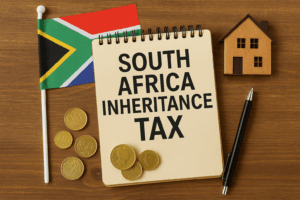Understanding South Africa inheritance tax is essential for anyone who holds assets in the country or expects to inherit from a South African estate.
But do you pay tax on inheritance in South Africa?
While South Africa does not use the term “inheritance tax” in a strict sense, it does impose estate duty, a tax on the total value of a deceased person’s estate.
Understanding how this tax works is key to protecting your wealth.
In this article, we’ll explore:
- How inheritance works under South African law
- The current South Africa inheritance tax rate
- What portion of an inheritance in South Africa is tax-free
- Calculation of South Africa estate duty
- How inheritance tax applies to non-residents
- Legal ways to reduce or avoid inheritance tax in South Africa
If you are looking to invest as an expat or high-net-worth individual, which is what I specialize in, you can email me (hello@adamfayed.com) or WhatsApp (+44-7393-450-837).
This includes if you are looking for a free expat portfolio review service to optimize your investments and identify growth prospects.
Some facts might change from the time of writing. Nothing written here is financial, legal, tax, or any kind of individual advice or a solicitation to invest.

How Does Inheritance Work in South Africa?

The process is governed by a clear legal framework that outlines how a deceased person’s assets are distributed, either according to their will or (if no valid will exists) under the rules of intestate succession.
South Africa Succession Law
South Africa’s inheritance laws are primarily guided by the Administration of Estates Act, the Wills Act, and the Intestate Succession Act.
These laws apply to both residents and non-residents holding assets in the country.
If a valid will is in place, the estate is distributed according to the deceased’s wishes.
If not, the Intestate Succession Act applies, distributing assets based on a fixed hierarchy of heirs, usually starting with the spouse and children.
Why is it important to have a will in South Africa?
Having a legally valid will is the most effective way to ensure that your estate is distributed as intended.
A will allows you to:
- Appoint an executor
- Allocate specific assets to chosen beneficiaries
- Minimize family disputes
Now, what happens when someone dies without a will in South Africa?
If someone dies intestate (without a will), the estate is divided among surviving relatives as prescribed by law.
This may lead to unintended consequences, especially in blended families or for individuals with offshore assets.
Administration of Deceased Estates
All deceased estates in South Africa must go through a formal administration process, overseen by the Master of the High Court.
Key steps include:
- Appointment of an executor
- Collection and valuation of assets
- Settlement of debts and taxes (including estate duty)
- Distribution of the remaining assets to beneficiaries
This process applies to both residents and non-residents who own South African assets and may involve delays or complications if foreign heirs or offshore assets are involved.
Understanding how inheritance works in South Africa is a critical step in ensuring your estate is properly managed and distributed, particularly in a cross-border context.
South Africa Inheritance Tax Explained
South Africa inheritance tax is commonly referred to as estate duty, a tax levied before the assets are distributed to beneficiaries.
Transferring wealth from one generation to the next can trigger tax obligations.
Inheritance Tax vs Estate Duty South Africa
Though often used interchangeably, there’s a technical difference:
- Inheritance tax is usually paid by the beneficiary receiving the inheritance.
- Estate duty, as applied in South Africa, is paid out of the deceased’s estate before the assets are distributed.
What Is Estate Duty in South Africa?
Estate duty is governed by the Estate Duty Act, which applies to the assets of both residents and non-residents of South Africa.
The estate is taxed before any distribution takes place, and the responsibility for calculating and paying this tax falls to the executor of the estate.
Certain deductions are allowed before calculating the taxable estate, such as debts, funeral expenses, and bequests to a surviving spouse.
Who is Liable for Estate Duty: Residents vs Non-Residents
- South African residents are subject to estate duty on their global assets.
- Non-residents are taxed only on South African situs assets, such as property or shares in local companies.
This distinction makes it essential for non-residents with South African ties to consider how their assets are structured and where they are located.
South Africa Inheritance Tax Rate
The estate duty rate applies to the taxable portion of a deceased person’s estate.
What is the inheritance tax threshold in South Africa?
As of now, estate duty in South Africa is charged at the following rates:
- 20% on the first R30 million of the dutiable estate
- 25% on any amount exceeding R30 million
Every individual is also entitled to a Section 4A abatement—an estate duty exemption of 3.5 million South African rand.
This means only the value of the estate above this threshold is subject to tax.
How do you calculate estate duty in South Africa?
Let’s say an individual passes away with a net estate of R20 million. Here’s how the estate duty would be calculated:
- Net estate value: R20,000,000
- Less Section 4A abatement: R3,500,000
- Dutiable amount: R16,500,000
- R16,500,000 x 20% = R3,300,000
- Total estate duty payable: R3,300,000
This illustrates how larger estates can face a significant tax burden without proper planning.
Impact of Capital Gains Tax on Inherited Assets
In addition to estate duty, capital gains tax (CGT) may apply.
Although inheritance itself is not a CGT event, the deceased is deemed to have disposed of their assets at market value upon death.
This triggers CGT on the gain from the original purchase price to the value at death.
For beneficiaries, the inherited asset receives a step-up in base cost, meaning CGT will only apply on future gains if the asset is sold.
Still, this interaction can significantly affect the net value of the estate and should be factored into planning.
Understanding the South Africa inheritance tax rate and related taxes like CGT is essential for safeguarding the value of your estate, especially for high-net-worth individuals and their heirs.
How Much Inheritance Is Tax-Free in South Africa?
While South Africa doesn’t have a traditional inheritance tax, it does impose estate duty on dutiable estates.
However, several exemptions can significantly reduce or eliminate this liability.
Estate Duty Exemptions and Thresholds
As mentioned before, Section 4A abatement provides an estate duty exemption of R3.5 million per individual.
In cases where the deceased was predeceased by a spouse who did not use their exemption, the surviving spouse’s estate may claim a combined exemption of up to R7 million.
Example: X died in December 2018 but had a predeceased spouse, Y, who died in 2017 and used R3 million of the section 4A abatement.
What is the value of the section 4A abatement in X’s deceased estate?
= (R3.5 million × 2) less any amount used by predeceased spouse
= R7 million less R3 million
= R4 million is available to X’s deceased estate.
This rollover benefit makes estate planning between spouses especially important.
What is excluded from estate duty in South Africa?
Assets bequeathed to a surviving spouse are fully exempt from estate duty, regardless of value.
This exemption defers taxation until the spouse’s own estate is assessed.
Additionally, any bequests made to approved public benefit organizations or charities are also exempt from estate duty, providing an opportunity for tax-efficient giving.
Implications for Different Asset Types
Certain asset classes may trigger additional considerations. For instance:
- Retirement funds usually fall outside the estate and may not attract estate duty, but payout taxes may apply.
- Life insurance proceeds paid to a nominated beneficiary are generally included in the estate for estate duty unless structured via a trust.
- Foreign assets are subject to estate duty for South African residents but may be exempt if tax treaties apply.
Inheritance Tax in South Africa for Non-Residents
South Africa levies estate duty on South African situs assets only. Those physically located or deemed to be located in South Africa.
The same estate duty rates and R3.5 million estate duty exemption apply, but they may not benefit from certain spousal rollovers or other domestic planning tools available to residents.
Rules for South Africa Situs Assets
For non-residents, South African situs assets typically include:
- Real estate located in South Africa
- Shares in South African companies
- Certain bank accounts and financial instruments
- Movable assets physically situated in South Africa
These assets are subject to estate duty regardless of where the deceased lived or died.
Probate and Tax Reporting Considerations
If a non-resident dies owning South African assets, the estate must be reported to the Master of the High Court in South Africa.
A local executor or agent acting on behalf of a foreign executor must be appointed to manage the process.
Key responsibilities include:
- Valuation of South African assets
- Submission of estate duty returns to SARS
- Ensuring tax compliance before asset distribution
In some cases, double taxation may arise if the deceased’s home country also taxes the estate or inheritance.
While South Africa has limited estate tax treaties, relief may be available through foreign tax credits or careful structuring.
How to Avoid Inheritance Tax in South Africa
The best approach is proactive, legal tax planning.
While estate duty applies to dutiable estates above a certain threshold, several legitimate strategies can reduce or eliminate the tax burden for your heirs.
Legal Tax Planning Strategies
Effective estate planning can significantly reduce the size of the dutiable estate. This includes:
- Structuring assets to fall outside the personal estate
- Making use of tax exemptions and deductions
- Working with professionals to ensure compliance and efficiency
Proper planning doesn’t just reduce taxes.
It also ensures a smoother administration process and quicker asset distribution to beneficiaries.
Use of Trusts, Donations, and Life Insurance
- Trusts can be used to hold assets outside the estate, especially when set up during your lifetime. Though trusts have their own tax rules, they can still be useful tools when structured correctly.
- Donations made during your lifetime (inter vivos) are exempt from donations tax up to R100,000 per tax year, per individual. Larger gifts may still be beneficial depending on timing and value.
- Life insurance policies, when directed to beneficiaries or held in a trust, may bypass estate duty and provide liquidity for heirs.
South Africa Inter Vivos Gifting and Section 4A Rebates
Giving away assets during your lifetime reduces what remains in the estate at death.
South Africa inheritance tax also offers a rebate of R3.5 million, which increases to R7 million for surviving spouses. These tools can be powerful when coordinated in a long-term estate plan.
Ultimately, understanding how to avoid South Africa inheritance tax means using the law to your advantage–preserving wealth, ensuring compliance, and protecting your legacy.
Pained by financial indecision?

Adam is an internationally recognised author on financial matters with over 830million answer views on Quora, a widely sold book on Amazon, and a contributor on Forbes.



